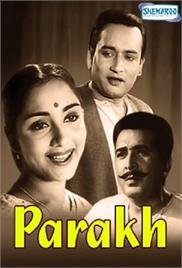Be Careful of Fake Websites. Always use HindiMovies.to domain & Join our Telegram Channel for Latest Updates.

Likes: 0
Views: 2.66K
Niravan (Nazir Hussain), the village postmaster receives an envelope with a cheque for a very large amount, with the instructions that he is to turn this cheque over to the most honest man in the village. Honest Niravan calls a village meeting and informs them of this outcome. They mutually agree that there are five people in the village who can be called honest, however, since the stipulation states that the amount is to be turned to only one, they decide to hold elections in the village, so that everyone can decide who the most honest man is. The outcome is hilarious as all the five prominent people bend over backwards not only to be honest and caring, but also be seen to be honest and caring. The village doctor starts treating all patients regardless of their ability to pay him; the village money-lender starts forgiving loans; the wealthy zamindar allows everyone to drink water from his property; the village priest allows the untouchables to worship in the temple. Can these people be trusted with a large sum of money? Can Niravan be trusted with this money, as he has his own liabilities, a large sum he owes to money-lenders, as well as provide dowry for the forthcoming marriage of his daughter, Seema (Sadhana).
Duration: 136 min
Released: 1960
IMDb Rating: 7.7/10 (61 Votes)
Genre: Comedy, Drama, Hindi Movies, Romance
Stars: Durga Khote, Leela Chitnis, Sadhana, Sheela Rao
Directors: Bimal Roy
Writers: Salil Choudhury, Shailendra
Year: 1960
Server 1 – Openload
Server 2 – Vidto
Server 3 – Streamin
Server 4 – Youtube
Parakh (1960): A Timeless Classic of Comedy, Drama, and Romance
Released in 1960, Parakh stands as a shining example of Bollywood's golden era, blending elements of comedy, drama, and romance in a way that both entertains and offers subtle societal observations. The film was directed by Bimal Roy, a maestro of Indian cinema known for his poignant storytelling and ability to capture human emotions with depth and nuance. The screenplay was penned by Nabendu Ghosh, who worked closely with Bimal Roy to craft a narrative that remains relevant even today.
Plot Summary:
At its heart, Parakh is a narrative about honesty, integrity, and social responsibility wrapped within an engaging comedic drama. The story unfolds in a small town in India where an anonymous donor gifts a sum of money to the local panchayat (village council) with the condition that the funds be used for a noble cause. The villagers embark on a journey to choose the most deserving recipient for this money, which brings several characters and their motivations to the fore, highlighting human follies and virtues alike.
The plot is skillfully woven to not just entertain but also to prompt the audience to reflect on the nature of goodness, the corruption of intentions, and the true meaning of philanthropy. This tight blend of a comedic story with serious social themes is what makes Parakh memorable and significant in Indian cinema history.
Main Cast and Key Characters:
Supporting cast members also deliver strong performances that enrich the film’s texture and complete the portrait of the rural community caught in a moral dilemma.
Director and Writer:
Bimal Roy, the director, was renowned for his ability to blend social commentary with captivating cinema. His filmmaking style in Parakh is marked by an emphasis on realism and understated performances. Under his guidance, the film avoids melodrama, opting instead for authentic, thought-provoking storytelling.
Nabendu Ghosh crafted the screenplay and dialogues. His writing skillfully captures the nuances of rural life and human nature, making the characters relatable to audiences across generations. The narrative flows smoothly, balancing comedic elements with moments of tension and introspection.
Music and Songs:
As a Bollywood movie from the 1960s, Parakh features a melodious soundtrack that complements the movie's tone and themes. The music was composed by the legendary Salil Chowdhury, whose compositions are known for their blend of Indian classical and western musical influences.
The songs in Parakh are soulful, lyrically rich, and performed by some of the most celebrated playback singers of the time. Notable songs include:
The songs serve more than just a musical interlude; they are carefully integrated into the storyline, enhancing the emotional depth and cultural ambiance of the film.
Cinematic Significance:
Parakh occupies a special place in Indian cinema for several reasons. It is a film that showcases Bimal Roy's mastery in bringing socially relevant topics to the fore without compromising on entertainment. The movie’s script, performances, and music come together to create a richly layered cinematic experience.
The film's exploration of human nature—greed vs. generosity, selfishness vs. altruism—resonates universally, making it a timeless classic. Its comedic elements are employed smartly to highlight societal hypocrisy subtly, ensuring the message does not overwhelm the storytelling.
Moreover, the film's treatment of romance is refreshingly mature and understated, focusing on emotions rather than spectacle, which was somewhat ahead of its time in Bollywood's commercial framework.
Conclusion:
In retrospect, Parakh (1960) is a film that deserves attention not just for its entertainment value but also for its insightful commentary on human values and societal ethics. The combination of Bimal Roy's direction, Nabendu Ghosh's writing, memorable performances by Motilal and Vasant Choudhury, and Salil Chowdhury's evergreen music make this movie an exquisite piece of cinematic art.
For cinephiles interested in India’s film heritage, Parakh is a must-watch. It is a testament to the power of storytelling that transcends time, language, and culture, reminding us all to look deeper—beyond the surface—and to judge with a discerning eye and a compassionate heart.